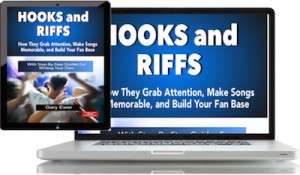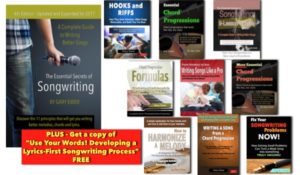You may not think of tempo as being part of a song that warrants a lot of experimentation. Usually in the songwriting process you’re focusing on chord choice, melody notes, and of course lyrics.
But tempo has a huge role to play especially in creating a mood for your song. Moreover, it can allow you some sophisticated shadings of moods, and all you usually have to do is to move the tempo a few beats per minute in one direction or the other.
 “Hooks and Riffs: How They Grab Attention, Make Songs Memorable, and Build Your Fan Base” shows you how songwriters in decades past have used many different kinds of lyrics to create great songs. Use it to create your own great song hooks.
“Hooks and Riffs: How They Grab Attention, Make Songs Memorable, and Build Your Fan Base” shows you how songwriters in decades past have used many different kinds of lyrics to create great songs. Use it to create your own great song hooks.
There’s a strong psychological aspect of tempo in how listeners perceive music. The best demonstration of that is to go online and listen to several live versions of a song for which you are familiar with the studio version.
The tempo of that studio version would have been chosen carefully by the performers and the producer as the tempo that best establishes the mood of the music and the meaning of the lyric.
But in live situations, there are important circumstances that can change what the band thinks is the best tempo for that song. Tempo choice is likely to be affected in two main ways:
- the tempo of the song just prior to it in the setlist;
- the excitement-level/mood of the audience in general.
But if you’re recording your a song, you’ve got an important opportunity to experiment with and establish a tempo that really enhances all the various components of that song.
There are no rules here, of course, because each and every song is unique. But if you’ve been spending most of your time experimenting with chords, melody notes and lyrics, don’t forget the power you have to manipulate the mood (and thus your audience) by playing around a bit with the tempo.
You may want to record a few versions of your song at different tempos, and then choose a different day to listen to them. By waiting a day or two, you’re more likely to hear the tempo choices with fresh ears, and it will give you the most objective viewpoint.
 Written by Gary Ewer. Follow Gary on Twitter.
Written by Gary Ewer. Follow Gary on Twitter.
 “The Essential Secrets of Songwriting” eBook bundle includes “Writing a Song From a Chord Progression”. Learn how to write great songs by starting with the chords, and then avoiding all the potential pitfalls of the chords-first songwriting process.
“The Essential Secrets of Songwriting” eBook bundle includes “Writing a Song From a Chord Progression”. Learn how to write great songs by starting with the chords, and then avoiding all the potential pitfalls of the chords-first songwriting process.










